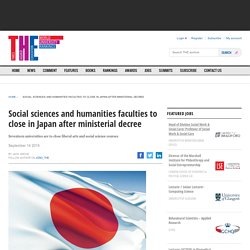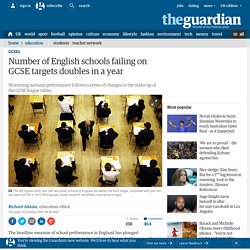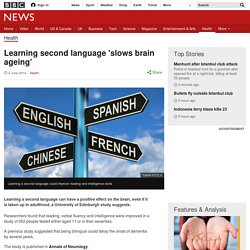

Social sciences and humanities faculties to close in Japan after ministerial decree. Many social sciences and humanities faculties in Japan are to close after universities were ordered to “serve areas that better meet society’s needs”.

Of the 60 national universities that offer courses in these disciplines, 26 have confirmed that they will either close or scale back their relevant faculties at the behest of Japan’s government. It follows a letter from education minister Hakuban Shimomura sent to all of Japan’s 86 national universities, which called on them to take “active steps to abolish [social science and humanities] organisations or to convert them to serve areas that better meet society’s needs”. The ministerial decree has been denounced by one university president as “anti-intellectual”, while the universities of Tokyo and Kyoto, regarded as the country’s most prestigious, have said that they will not comply with the request. jack.grove@tesglobal.com. Cheating found to be rife in British schools and universities. British education is experiencing an epidemic of trickery and cheating, ranging from primary school teachers rigging key assessments through to 40,000 university undergraduates disciplined for plagiarism over the past four years.

An investigation by Channel 4 Dispatches, to be screened on Monday night, describes how shady practices and in some cases outright fraud are woven into the fabric of UK education as the use of exam results, league tables and performance indicators increases the pressure on students, teachers and institutions to succeed. A series of freedom of information requests by the Channel 4 researchers found that in the past four years more than 58,000 undergraduates have been investigated by their universities for plagiarism. Of the 40,000 who were disciplined, 400 were expelled or excluded from higher education, while 12,000 had marks deducted, affecting their final degree classification in many cases. Students used to take drugs to get high. Now they take them to get higher grades.
It’s still more than three months until finals, but there’s a whiff of panic in the air of the Edinburgh student flat where I’m having dinner.

“Everybody’s feeling it,” says Suzy. Feeling what? “The pressure. There’s just so much pressure.” About what? “Everything. Modafinil: a prescription-only medication for narcolepsy that the NHS’s website describes as “a central nervous system stimulant” that prevents “excessive sleepiness during daytime hours”. “It’s not that it makes you more intelligent,” says Phoebe, a history student. But isn’t it cheating? “My ex-girlfriend used to say that to me,” says Johnny, another history student. Everyone’s taking it, they say. You do have to be to be careful though, says Johnny. Foreign pupils don't harm grades of English speakers - Education News - Education - The Independent. The findings will reassure parents concerned that their children could lose out by being in classes with non-native English speakers, who can take up more teaching time.

Researchers found that pupils with English as their mother tongue who attended schools where many pupils spoke foreign languages did no worse in primary school tests and GCSEs than children who attended school where the majority spoke only English. On average, English as an additional language (EAL) pupils were behind aged five but had caught up by the age of 16 and were ahead in some areas such as GCSE maths. But the authors of the report, Professors Steve Strand and Victoria Murphy, warned the overall figures masked a huge range of results for pupils of different backgrounds. Speakers of Portuguese, Somali, Lingala and Lithuanian did badly at GCSEs but speakers of Russian and Spanish did well.
Number of English schools failing on GCSE targets doubles in a year. The headline measure of school performance in England has plunged dramatically in the wake of changes to exam rules and league tables, according to official figures for school GCSE results published by the Department for Education.

The impact of the changes, along with a slight fall in GCSE grades awarded last summer, saw a doubling in the number of schools that failed to reach the government’s floor target of 40% of pupils attaining five GCSE grades between A* and C, including passes in English and maths. The DfE figures published on Thursday show that 330 secondary schools in England were below the floor target, compared with just 154 last year and 195 in 2012. Nationally, schools saw 53% of their pupils pass the government’s measure, a steep fall from 59% last year.
The fall was less-marked in state schools alone, dropping four percentage points to 57%. Learning second language 'slows brain ageing' Image copyright Thinkstock Learning a second language can have a positive effect on the brain, even if it is taken up in adulthood, a University of Edinburgh study suggests.

Researchers found that reading, verbal fluency and intelligence were improved in a study of 262 people tested either aged 11 or in their seventies. A previous study suggested that being bilingual could delay the onset of dementia by several years. The study is published in Annals of Neurology. The big question in this study was whether learning a new language improved cognitive functions or whether individuals with better cognitive abilities were more likely to become bilingual. Dr Thomas Bak, from the Centre for Cognitive Ageing and Cognitive Epidemiology at the University of Edinburgh, said he believed he had found the answer. Mother jailed for allowing son to miss 174 school days ‘because she wanted a lie-in’